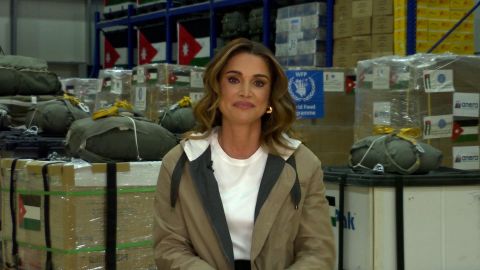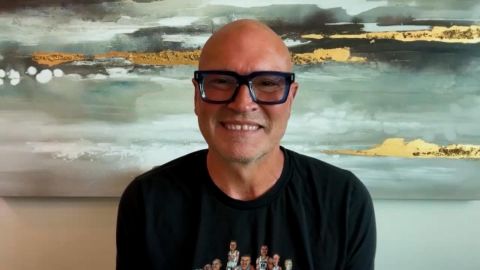Read Transcript EXPAND
CHRISTIANE AMANPOUR, CHIEF INTERNATIONAL ANCHOR: Can I first ask you, it is Ramadan, it’s just started, and I wonder what your reflections are for yourself, for your family, for Muslims around the world celebrating, or maybe that’s not the right word, marking Ramadan this year in the middle of this war?
QUEEN RANIA AL ABDULLAH, JORDANIAN QUEEN: Well, you know, Christiane, Ramadan for us is a month of worship, charity, and compassion for our fellow human being. And I think this year, we’re welcoming these holy days with very heavy hearts. Ramadan is typically defined with family gatherings, people coming together, sharing a meal and breaking their fast together. But what is it like for the people of Gaza today who are now hungry and thirsty in tents or makeshift shelters, who are mourning their death and mourning the life that they had just a few months ago? You know, Christiane, since the beginning of this war, Israel has cut off everything that is required to sustain a human life, food, fuel, shelter, medicine, water, and it has been going on now for five months and left the people of Gaza completely reliant on outside assistance. And actually, it has systematically denied and delayed a lot of that assistance, occasionally bombing some of the convoys that bring this assistance and bombing some of the people — shooting at some of the people who are trying to get whatever scarce resources that they can get. According to the U.N. every single person in Gaza today is hungry. Over a quarter of the population, that’s more than 550,000 people, are one step away from famine. Experts say that they have never seen a population descend into such mass hunger so rapidly. I mean, I’m hearing of people just eating whatever they can get their hands on, including grass or they’re having to grind, you know, bird feed or animal fodder just to make bread. And in the north of Gaza, people are not on the verge of starvation, they’re actually dying of starvation. It starts with the most vulnerable, the elderly, the wounded, babies. We’re hearing increasing number of babies who are dying from severe malnutrition and thirst. And if things don’t change, I think these cases are going to be spiraling throughout the strip. And, you know, this has been a slow-motion mass murder of children five months in the making. Children who were thriving and healthy just months ago are wasting away in front of their parents. You know, starvation is a very slow, cruel, and painful death. Your muscles shrink, your immune system shuts down, your organs give out. Imagine being a parent, having to go through that, witness your child going through that and not being able to do anything to help. It is absolutely shameful, outrageous, and entirely predictable what’s happening in Gaza today because it was deliberate.
AMANPOUR: Queen Rania, we have been reporting systematically what you are describing. In fact, a lot of the world is now and has been reporting this severe hunger, the statistics, the pictures that you’re talking about. I wonder whether you think that is the reason why, for instance, the United States, the U.K., other nations, which are allies of Israel, have started to really ramp up their need to deliver aid, like the airdrops that Jordan has been involved in, you see the U.S. doing it. You see the idea of a floating pier in order to bring much more aid via the sea. Do you think the message that you’ve just described has actually now gotten through?
QUEEN AL ABDULLAH: Well, look, let me just be very clear about what these airdrops are. They are us resorting to desperate measures in order to address a desperate situation. These airdrops are literally just drops in an ocean of unmet needs. And King Abdullah has said from the very beginning, they are neither sufficient nor they are substitute for, you know, humanitarian access at scale. So, countries should not use them as a way out, nor should they be viewed as an excuse for not doing what needs to be done. And that is implementing an immediate and sustained ceasefire, opening all access points into Gaza, particularly land routes, streamlining the inspection process and making sure that there is safe access within Gaza so that the aid can be distributed. Every moment counts. Children are starving as we speak. So, every moment and every meal counts. And so, I think now we’re past the stage of trying to talk Israel into doing these things. We need to actually start using measures and political leverage to get them to do those things.
AMANPOUR: Can I ask you to describe what Jordan has done? Well, first of all, you’re sitting in an air base. I believe behind you is some of the goods and humanitarian items that will be dropped. Tell me when they’re going to be dropped into Gaza and how has Jordan’s experience been with, for instance, its hospital there with the air dropping?
QUEEN AL ABDULLAH: Well, look, the reason why we started doing these air drops is we found that after trying so hard in vain to persuade Israel to open the access points, the land access points, that we had to do something. We couldn’t just sit idle and watch people starving. And so, King Abdullah started, you know, organizing these air drops. But I have to emphasize that the need is much greater than what we’re being able to provide. As it stands today, there are trucks — there’s tons of food in trucks that are miles away from people who are starving. So, this is — the hunger is not a natural disaster. This is a man-made — an Israeli made disaster. It is a — it is, you know, deprivation by design. No matter the volume of the aid going in, nothing is a substitute for a ceasefire. Delivering aid under bombardment does not stop the destruction, the death, and the heartbreak. We cannot save people from hunger only then to bomb them to death. So, again, an immediate ceasefire is the number one priority.
About This Episode EXPAND
Queen Rania al Abdullah of Jordan discusses humanitarian aid to Gaza. In his new book “The Achilles Trap” Steve Coll explores Saddam Hussein’s behavior in the lead-up to the Iraq war. Former NBA star Rex Chapman tells his story of overcoming addiction and more in his new book “It’s Hard for Me to Live with Me.”
LEARN MORE

